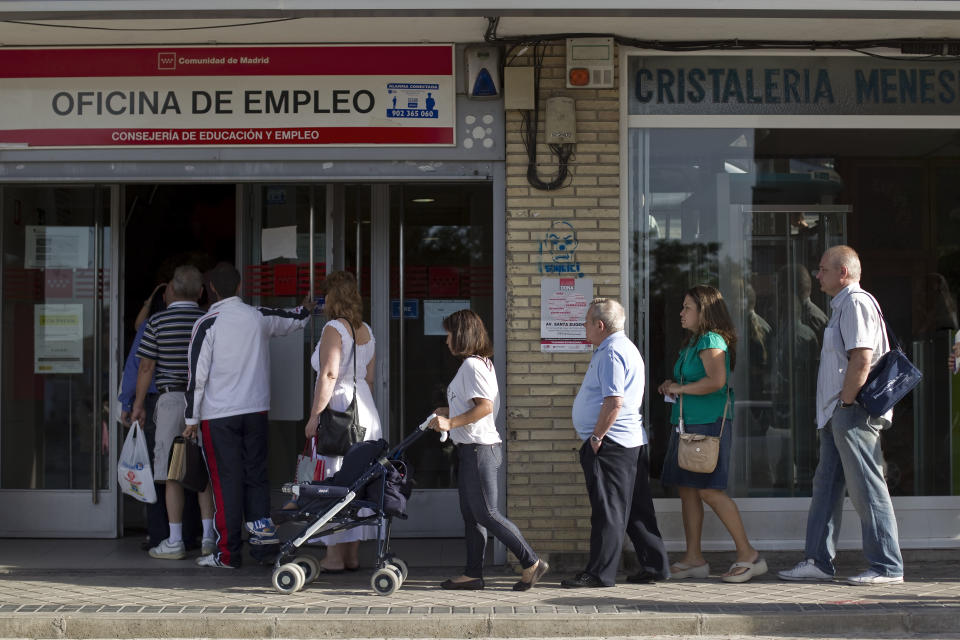Spain under pressure to outline banks rescue plan
MADRID (AP) — Spain was under pressure on Monday to reveal what it intends to do about its troubled banking sector as the government's borrowing rates in the bond markets stayed at worryingly high levels, reflecting investor concern that Madrid may need to ask for foreign aid.
The interest rate on the benchmark 10-year bond rate was at 6.39 percent on Monday, about 0.08 percentage points lower than on Friday but still perilously close to the levels that pushed Greece, Ireland and Portugal to ask for bailouts over the past two years.
The rate has risen as investors have become concerned that the government's public finances might be overwhelmed by the cost of rescuing banks that are sitting on massive amounts of soured real estate investments.
The most ailing lender, Bankia S.A., needs €19 billion in government aid, but Spain only has €5 billion left in a €19 billion fund that it established in 2009 to help banks. The government has promised to help Bankia but has not explained how.
Some estimates have put the cost of a complete bailout for the Spanish banking sector at between €50 billion and €150 billion.
Those concerns led conservative Prime Minister Mariano Rajoy to come out Saturday to deny that the country was at the edge of the abyss and reiterate that it would not need a bailout. But his comments did little to convince investors.
Fellow European countries, like Germany, which holds the purse strings for sovereign bailouts, are waiting for Spain to clarify its position and its needs.
"If help is needed, everyone knows that Europe stands ready, that Europe shows solidarity, and that Europe foresees aid instruments for this," Chancellor Angela Merkel's spokesman, Steffen Seibert, said in Berlin on Monday. "But the decision on that lies ... exclusively with the Spanish government."
Part of the problem is that if Spain were to ask for money from the EU bailout fund, the aid would come with strings attached — its fellow countries in the 17-nation eurozone and the International Monetary Fund could impose certain policies on the Spanish government, something Rajoy is keen to avoid.
But if Spain does not shore up its banking sector, investors could lose confidence in the country as a whole and drive its borrowing costs to unaffordable levels. That would force Spain to ask for money not only to save its banks, but also to finance itself. That would be a devastating scenario for Europe, as funding Spain, the eurozone's fourth-largest economy, would stretch the region's finances to breaking point.
Rajoy has repeatedly called on the European Union to come out strongly in defense of the euro so as to help Spain convince investors it won't be allowed to sink. He has also made indirect appeals to the European Central Bank to help bring down Spain's yields by buying the country's bonds. But so far his pleas have failed to produce any substantial changes.
The situation will be clearer at the end of June, when two international auditing firms contracted to study the health of Spain's banks report at the end of June.
"Spain needs this clarity, the eurozone needs this clarity," Germany's Seibert said.
The next four weeks, until the banks' audit report comes in, promise to be a rocky ride for Europe.
On June 17, Greece will hold a second round of general elections after the first poll in May proved inconclusive. The fear is that Greeks fed up with austerity measures will vote into power political parties that want to renege on the country's bailout terms. If it were to drop its bailout, Greece would face bankruptcy and could have to leave the euro currency bloc. Uncertainty over such a scenario is so great that the markets of Spain and Italy would get shaken further, destabilizing the entire region.
European leaders will then hold a summit on June 28 to present proposals on how to save the euro, which top EU officials have warned is not sustainable in its current form.
The European Commission and the European Central Bank will present a proposal that is expected to include creating a "banking union" to oversee banks and possibly even hold the power to offer bailouts directly, bypassing national governments.
Eurobonds, or debt issued jointly by eurozone countries, is another option likely to be discussed though Germany remains opposed because it says it would lower incentives for indebted countries to heal their finances. Seibert on Monday reiterated Berlin's Germany's rejection of eurobonds as a solution for the debt crisis.
Other proposals will include measures to boost economic growth in the eurozone, where seven countries are in recession.
Spain is struggling with an unemployment rate of 24.4 percent, with more than 50 percent of people under 25 out of work.
The latest showed the number of people registered as unemployed dropping by 30,113 in May for a total of 4.71 million. May is traditionally good for hiring as companies prepare for the vacation season and the figure normally drops by much more.
____
Daniel Woolls in Madrid and Geir Moulson in Berlin contributed to this report



